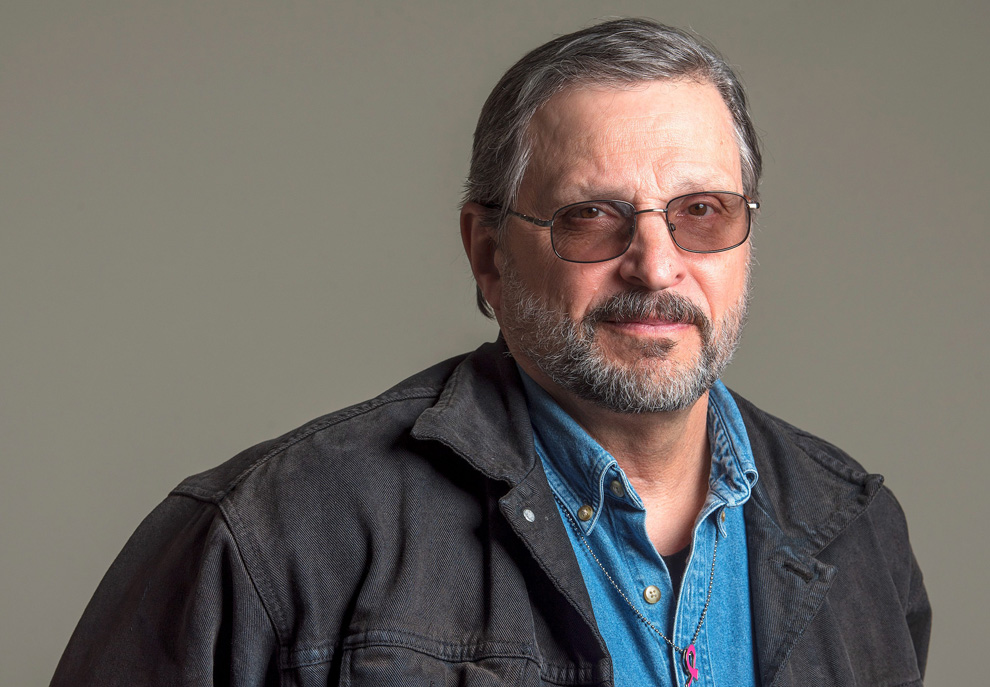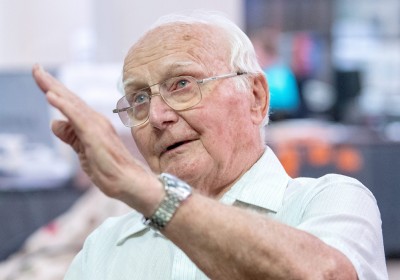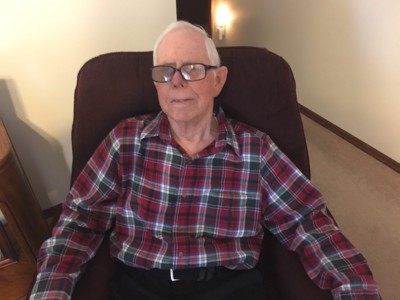Ray Wolst
By Paul Wood

Photo By Stephen Haas/The News-Gazette
RANTOUL — Vietnam era veteran Ray Wolst is on Tuesday’s honor flight.
“I’m pretty proud of that, and I’ve never been to Washington,” the Rantoul man said.
Wolst, 63, who grew up on the South Side of Chicago, is a patriotic guy, and he enlisted in the Army while the Vietnam War was still winding down.
He was in high school and took delayed entry in December 1974. But his active duty started in 1975, just a few weeks too late for him to serve in Vietnam, and his service was entirely stateside.
He said that the military couldn’t quite find its place, its role in the world, in the immediate aftermath of the war.
He jumped out of a helicopter a few times as part of the airborne training he volunteered for at Fort Bragg, S.C., but he also served as a personnel clerk.
So he saw firsthand “the mess” of shortage and racial tension in the mid-1970s.
“At the end of Vietnam, we could only send one company at a time into the field for maneuvers because of a lack of full gear,” Wolst said.
Though that was remedied, racial tensions had heightened during the war, Wolst said.
African Americans made up a large part of combat troops, double that of white troops, and fewer were officers, according to the three-volume “Encyclopedia of the Vietnam War: A Political, Social and Military History.”
African Americans were almost a quarter of the Army’s killed in action in 1965.
“There was a lot of racial tension,” Wolst said. “I didn’t pick sides, I just wanted everybody to get along.”
In one 1977 incident, about 16 enlisted men, white and black on each side, faced off with a potential for violence. Wolst doesn’t know if any of them were armed.
“Most of the combat veterans did not get involved,” he said.
“I got between them and told them this was not worth screwing up their lives and families,” he said. “I looked at them, and they didn’t look like they really wanted to go through with this.”
He joked, “What we’ve got here is failure to communicate,” at that time a popular line from the Paul Newman movie “Cool Hand Luke.”
“Some of the guys started to laugh,” Wolst added.
Eventually, the troops dispersed.
“Afterwards, I thought I was pretty stupid to get involved with that,” he admitted.
He transferred to Fort Sheridan north of Chicago late in 1977 or early in 1978, given compassionate leave to take care of his father. The atmosphere there was much lighter than in the deep South.
“It was the complete opposite of Fort Bragg,” Wolst said.
He considered re-upping, then left Chicago to work in California doing light construction, carpentry and painting.
His car was rear-ended by a drunk driver, and other accidents followed, putting him out of commission.
“I wasn’t able to move for a while,” he said.
Wolst laughs about how much metal is in his repaired back (five surgeries) and his relatively new knee replacement, which he said has not been as successful as the back surgeries.
Do you know a veteran who could share a story about military service? Contact Paul Wood at pwood@news-gazette.com.
Read more stories from local veterans:
 Tom Gordon
URBANA — Tom Gordon didn’t care to join the Army, because he’d have to carry an M1 carbine. Instead, he enlisted in the …
Tom Gordon
URBANA — Tom Gordon didn’t care to join the Army, because he’d have to carry an M1 carbine. Instead, he enlisted in the …
 Gene Richards
Major Gene Richards “walked through the rain, but didn’t get wet” in Afghanistan. The rain includes small arms fire, mor …
Gene Richards
Major Gene Richards “walked through the rain, but didn’t get wet” in Afghanistan. The rain includes small arms fire, mor …
 Dick Oliver
CHAMPAIGN — From the Korean War to the Cold War to Vietnam, Dick Oliver kept the planes flying for 20 years. The Air For …
Dick Oliver
CHAMPAIGN — From the Korean War to the Cold War to Vietnam, Dick Oliver kept the planes flying for 20 years. The Air For …